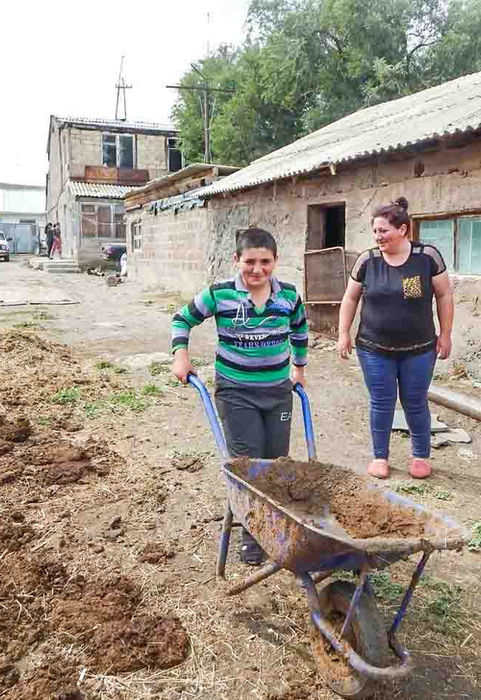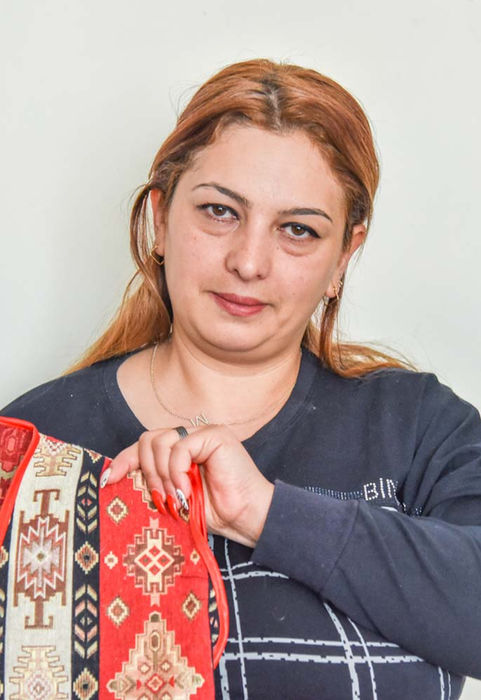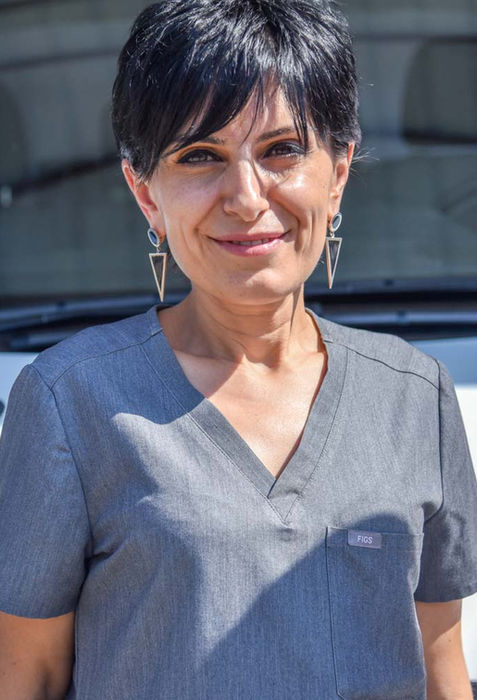
FAR for Artsakh

When the Artsakh War shattered a fragile peace in October of 2020, FAR was a leader in the humanitarian response to help Armenians in need. Forced to flee their homes, and often their livelihoods, thousands needed shelter, warmth, and food. FAR addressed the immediate crisis with the distribution of food and hygiene packages, and shelter provision. When the widespread fighting ceased and the immediate needs were overshadowed by demand for sustainable solutions, FAR continued its work of helping this population, an initiative that turned into the FAR for Artsakh program.
In the past two years, FAR has launched several projects aimed at strengthening the long-term resilience and resettlement needs of Armenians from Artsakh, as well as initiatives to contribute to building and rebuilding institutions and resources within Artsakh.
Continuing this vision of making the lives of Armenians from Artsakh safe, stable, and protected through assistance and empowered through new opportunities, FAR in 2022 further expanded the program by launching additional projects focused on child protection.

Edik’s family now lives in a house in Armenia’s Sisian Region because of FAR’s Support for Artsakh’s Displaced Project, which has helped six families in total to find sustainable housing in addition to food, clothing, and employment—almost everything needed to find stability in a new home.
In addition, 30 other displaced individuals from low-income families have been provided with income opportunities through animal husbandry, agriculture, and engineering.
Today Edik's family lives in a two-story house and Edik is working full-time as a mechanic, also thanks to FAR’s help, which supported him to start his new business. Anna is engaged in animal husbandry and greenhouse cultivation.
“If not for the house and my small business, we would have to go back to Artsakh without any hope or a roof over our heads,” Edik said. "FAR gave us hope—the hope to build a future in Sisian.”






Edik Mnatsakanyan
When he fled the violence in Artsakh in 2020, Edik Mnatsakanyan believed that he would be back home again in a few days after the flare-up subsided.
That never happened.
Like the hundreds of families forced to flee the most recent Artsakh War, Edik, his wife, Anna, who was pregnant at the time, and their three children, sought refuge about 90 miles away from their home, across the border in Armenia.
“We had a prosperous life in Artsakh. We enjoyed the warm climate; I had a good job,” Edik said. “We never imagined that we would find ourselves in such a situation.”
Highlighted Beneficiary
Other recreational outlets were provided to local students and youth in Sisian through community events, sports and cultural competitions, and art shows—all aimed at contributing to a healthy community. In addition, 59 Artsakh teens participated in training, education, seminars and counseling sessions.
Construction of the Smart Agriculture Development Center started during 2022 and is expected to be complete during 2023. Its aim is to create a regional educational hub that promotes the development of modern agricultural infrastructure in Syunik Province. Once completed, the center will feature a smart barn and a hydroponic feed production space, among other facilities. These resources will serve as a continuous education complex for students and rural families in the region, offering training courses in agricultural topics and practical learning courses to acquire skills.
An extracurricular group focused on sustainable farming practices was also formed and attended by 16 local children. The group shows them a potential path toward income-generation and self-sustainability, as well as sustainable land and agriculture management, combining theory and practical study at various local gardens, orchards, farms, and labs. As the project targets those living in the Sisian Region of Armenia’s Syunik Province—a place where many from Artsakh have resettled—it’s another way to integrate resettled children into their new communities. The group also inspired nine of the students to begin their studies at the State Agricultural College and the Sisian State Agricultural University.


In addition, 15 physicians and 16 nurses from the region participated in two- and four-week professional development programs.
Support for Artsakh’s Displaced also improved the region’s mainstream education system to ensure a safe and conducive environment through the rehabilitation of science labs at four different schools, which ultimately impacted 1,800 children. Concurrent teacher trainings were held on how to make best use of the labs, and faculty said that students immediately showed an increased interest in physics, chemistry and biology following these improvements. In addition, sanitation and hygiene facilities were renovated at two middle schools.
FAR also supported 80 schoolchildren from vulnerable families through the distribution of school bags and necessary supplies. An additional 34 schoolchildren received stipends in order to continue attending art and music schools, as well as sports clubs in Sisian, so as to further to develop their talents and learn new skills. Twenty children from Sisian also were able to attend Aragats Summer Camp.



In 2022, 115 vulnerable families were provided assistance through need-based support packages, which included medication, clothing, school supplies, as well as home goods, such as kitchenware and bedding, and appliances like washing machines, ovens, and refrigerators. They were also supported by FAR social workers through referrals and case management.
Support groups were organized for 30 adults to help them overcome the impact of war-related trauma.
In addition, 36 displaced families started to engage in income-generating activities for the first time since leaving Artsakh.
Community-based training opportunities such as awareness-raising on public health topics were provided to 800 community members (including young mothers and youth) from Sisian through 75 training sessions.

Support for Artsakh’s Displaced
During its second year, Support for Artsakh’s Displaced expanded its scope, making an even greater impact for the Armenians who fled their homes in Artsakh and who have had to start over. The great challenges that come with displacement—the need for stable housing, a steady income, good health and education, among other things—if not mitigated can ruin lives.
As many from Artsakh migrated to the Sisan Region of Syunik Province with no hope of return after their villages in Artsakh were claimed by Azerbaijan, Support for Artsakh’s Displaced continued to focus on assisting the large population of Artsakh Armenians who are trying to rebuild their lives in the region, by helping them surmount the challenges of resettlement and to thrive.
During 2022, 21 physicians from Armenia were deployed to Artsakh for the program, each specializing in pediatric neurology, endocrinology, and imaging diagnostics. Ten of these doctors returned for a second time and three are still working in Artsakh. One participant who extended her time with the program, ultimately created a “Diabetes School” by holding weeklong trainings in Artsakh to help improve treatment methods and management of the disease, which were then duplicated in three other locations in Artsakh: Stepanakert, Arevik, and Martuni.
Three of the programs participants also decided to join as full time staff members at Artsakh hospitals. This project has also inspired many Artsakh doctors in training to decide to return to their home in order to improve the healthcare system following the completion of their residencies And many other doctors from Artsakh have been inspired by this project as they plan to return to Artsakh after completing their residencies in Yerevan.
Through the project, a pediatric EEG machine which is used to measure brain waves in the research of epilepsy was also donated to Arevik Medical Center, a pediatric clinic in Stepanakert.

Doctors for Artsakh
The Artsakh War of 2020 nearly decimated Artsakh’s fragile healthcare system and also caused an exodus of its medical staff. As a result, the Doctors for Artsakh project was launched in March 2021 with the aim of filling gaps in medical personnel and revitalizing Artsakh’s healthcare system. Through the project, leading doctors from Armenia agree to work in various hospitals and clinics on a rotating basis. Doctors have the choice of staying in Artsakh for a duration of anywhere between two weeks and six months.

Supporting Foster Care Development
This year also brought FAR another step toward ensuring greater child protection in Artsakh through the introduction of a new foster care program. Supporting Foster Care Development is the latest initiative to deinstitutionalize care for orphans.
Artsakh’s government approached The FAR Child Protection Center during 2022, and asked for its assistance to remove 20 children from a Stepanakert orphanage. Child Protection Center staff immediately set to work, organizing inter-sectorial meetings and seminars with Artsakh ministries and decisions makers. In addition, they organized a trip to Yerevan for 25 key personnel from Artsakh’s Ministry of Social Development and Migration in order to learn about the processes and procedures and the lessons learned from the implementation of the foster care system in Armenia. Potential foster families were also trained on the fundamentals of foster care.
Azerbaijan’s blockade has frozen this process for the time being. However, approved foster families eagerly await their new roles, and FAR’s child protection staff stand by ready to support the growth of this process in 2023.

Developing Child Protection Center
During 2022, The FAR Child Protection Center in Yerevan continued to provide support to Artsakh’s government to further develop its own system of social services and strengthen child protection with the establishment of the Child Protection Center in Martakert, Artsakh.
Construction and renovation work started during the second half of 2022, but work stopped due to the blockade imposed by Azerbaijan in December. As we wait to complete construction on the new facility, which will offer safe haven to children in need and provide much needed links to services, FAR has trained a competent staff of social workers who will be ready to work and the new center upon its opening.

Social Workers for Artsakh
In the wake of an Artsakh torn apart by war, FAR launched a new project in 2021 aimed to establish a social services system in a place where none previously existed. With many families returning to Artsakh after the ceasefire but with no systematic support network to lean on to help them rebuild their disrupted lives, connect them with resources, and find solutions to their complex problems, this infrastructure was desperately needed.
Social Workers for Artskah is an inclusive psychosocial protection program developed and launched by the FAR Children’s Center in collaboration with Armenia’s Association of Social Workers. Through the project the establishment of the Social Workers Institute, has enabled its first group of 90 to receive training.
In 2023, 25 paraprofessionals completed 216 hours of training and each is working specifically on establishing psychosocial support centers in Artsakh, ultimately contributing to establishing a social services network in Artsakh for the first time. Nine of these social workers are now able to provide support to the war-affected population at the first psychosocial center, which was established in Martuni.
36
displaced families engaged in income-generating activities for the first time since leaving Artsakh
(Support for Artsakh’s Displaced)
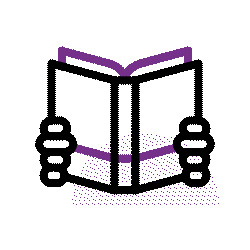
115
physicians from Armenia were deployed to Artsakh for the program, each specializing in pediatric neurology, endocrinology, and imaging diagnostics.
(Doctors for Artsakh)

800
community members (including young mothers and youth) from Sisian were provided with community-based training opportunities such as awareness-raising on public health topics through 75 training sessions
(Support for Artsakh’s Displaced)
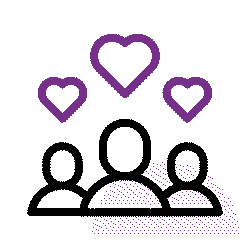
36
displaced families engaged in income-generating activities for the first time since leaving Artsakh
(Support for Artsakh’s Displaced)

115
vulnerable families were provided with emergency assistance as well as home goods, such as kitchenware and bedding, and appliances like washing machines, ovens, and refrigerators.
(Support for Artsakh’s Displaced)
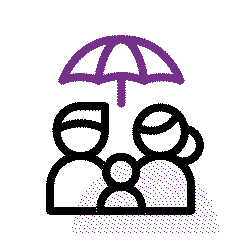
FAR for Artsakh Program
By the Numbers
The Norman K. Miller Charitable Fund
Hovanes Nigohosian - Nigohosian Benevolence Fund
Ajemian Foundation
HoVeKim Foundation
New York Friends of Gavar School
Harold and Josephine Gulamerian Foundation
Leon Semonian (Robert A. Semonian Foundation)
Armenian Medical Fund
Nazarian Family Foundation
AAHPO





